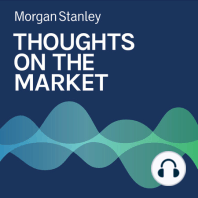3 min listen

2023 Global Strategy Outlook: Big Shifts in Dynamics
2023 Global Strategy Outlook: Big Shifts in Dynamics
ratings:
Length:
10 minutes
Released:
Nov 17, 2022
Format:
Podcast episode
Description
In looking ahead to 2023, the big dynamics of this year are poised to shift and investors will want to look for safety amidst the coming uncertainty. Chief Cross Asset Strategist Andrew Sheets and Global Chief Economist Seth Carpenter discuss.----- Transcript -----Seth Carpenter: Welcome to Thoughts on the Market. I'm Seth Carpenter, Morgan Stanley's global chief economist. Andrew Sheets: And I'm Andrew Sheets, Morgan Stanley's chief cross-asset strategist. Seth Carpenter: And on part two of this special two-part episode of the podcast, we're going to focus on Morgan Stanley's Year Ahead strategy outlook. It's Wednesday, November 16th, at 10 a.m. in New York. Andrew Sheets: And 3 p.m. in London. Seth Carpenter: Andrew, on the first part of this, you spent a bunch of time asking me questions about the outlook for the global economy. I'm going to turn the tables on you and start to ask you questions about how investors should be thinking about different asset prices going forward. There really was a big change this year, we came out of last year with big growth, things slowed down, but inflation surprised everyone to the upside. Central banks around the world started hiking rates aggressively. We've seen massive moves in FX markets, especially in the dollar. Things look very, very different. If you were to say, looking forward from here to the next year, what the biggest conviction call you have in terms of asset allocation, what would it be? Andrew Sheets: Thanks, Seth. It's that high grade bonds do very well. You know, I think this is a backdrop where 2022 was defined by surprisingly resilient growth, surprisingly high inflation, and surprisingly hawkish monetary policy relative to where I think a lot of investors thought the year would start. And, you know, if I think about 2023 and what you and the economics team are forecasting, it's big shifts to all three of those dynamics. It's much softer growth, it's softer inflationary pressure. And it's central banks pausing their tightening cycles and then ultimately easing as we look further ahead. So, you know, 2022 is exceptionally bad for high grade bonds, investment grade rated bonds, whether they're governments or mortgages or securitized bonds or municipals. So as the economy slows, as investors are looking for some safety amidst all that economic uncertainty, we think high grade bonds will be the place to be. Seth Carpenter: What is it that's so special about investment grade bonds as opposed to, for example, high yield bonds? And what is it about fixed income securities instead of equities that you think is so attractive? Andrew Sheets: Yeah. Thanks, Seth. So I do think there's an important distinction here because, you know, if I think about a lot of different assets in the market, I think there are a lot of assets that are primarily concerned at the moment with rate uncertainty or policy uncertainty. When will the ECB finally stop hiking rates? When will the Fed finally stop hiking rates? How high will Fed funds go? Now there's another group of assets, and I think you could put the S&P 500 here, U.S. high yield bonds here that are concerned about those questions of interest rates. Obviously, interest rates matter for these markets, but those markets are also concerned about the economic slowdown and how much will the economy slow. So I think when people look into the year ahead, what you want to focus on are assets that are much more about whether or not rate uncertainty falls than they are about how much will the economy decelerate. So we think of high grade bonds as a perfect example of an asset class that cares quite a bit about interest rate uncertainty while being a lot less vulnerable to the risk that the economy slows. And I think emerging market assets are also an example of an asset class that's really sensitive, maybe more sensitive to the question of how high will the Fed hike rates? And just given where it's currently priced, given how much it's already declin
Released:
Nov 17, 2022
Format:
Podcast episode
Titles in the series (100)
Mike Wilson: How Confident Are U.S. Businesses in the Economy? by Thoughts on the Market